Easy Flank Steak Fajitas
10
Published Nov 05, 2024
This post may contain affiliate links. Please read our disclosure policy.
Spice up your dinner routine with my easy Flank Steak Fajitas recipe. This classic Tex-Mex meal is made with just 10 simple ingredients and only about 20 minutes of active kitchen time—perfect for busy weeknights!
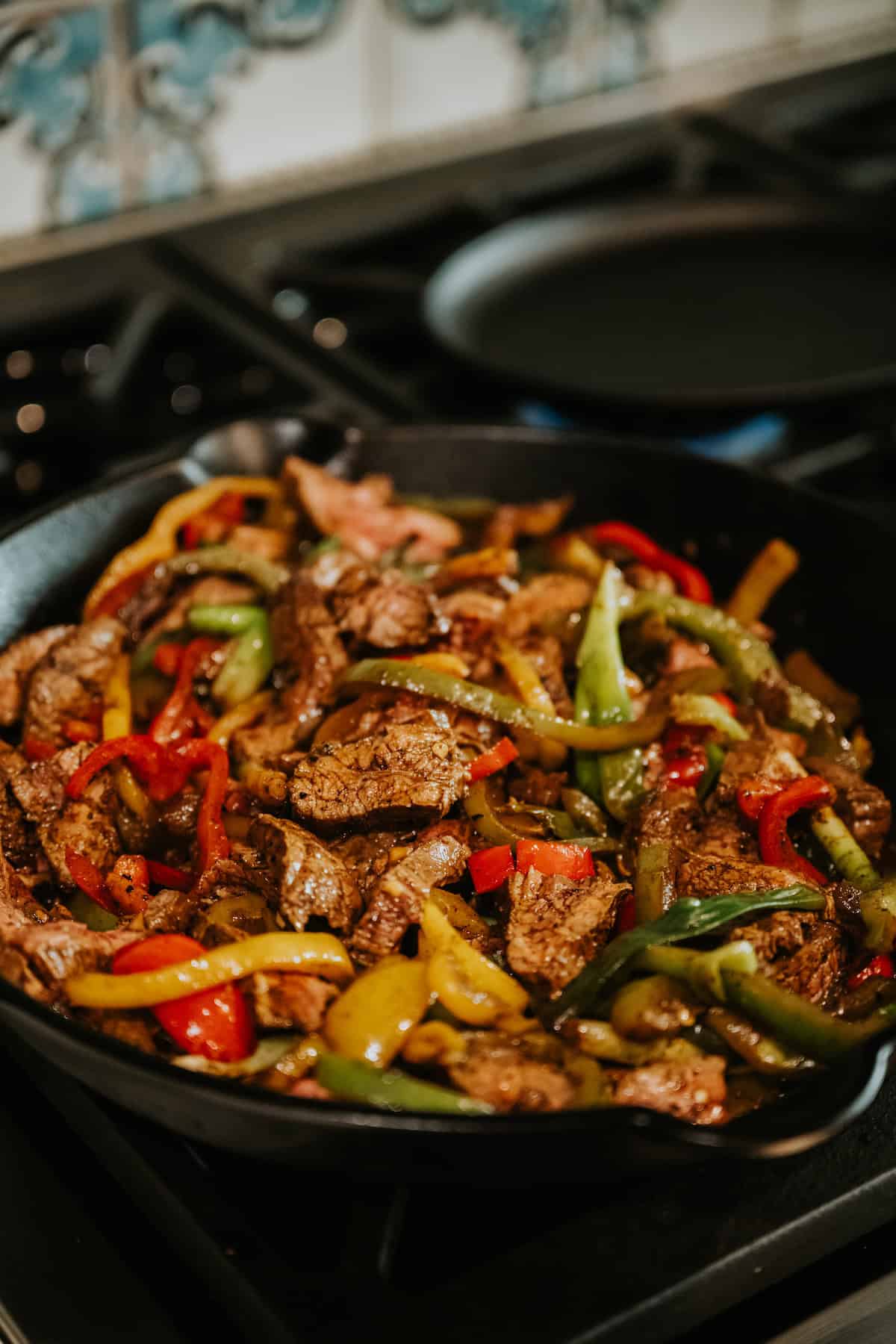
This easy steak fajitas recipe reminds me of growing up in El Paso and a now-closed restaurant called Wyngs. It was walking distance from the home I grew up in the Lower Valley and we ate there often. I have many fond memories going there with my mom, family, and friends when I lived in El Paso and on visits after I left. We celebrated dozens of happy occasions there.
This steak fajita recipe took me back to all those cherished occasions at Wyng’s.
Table of Contents
- What are steak fajitas? Are they Mexican?
- Why You’ll Love This Easy Steak Fajitas Recipe
- Ingredients & Substitutions
- How to Make a Restaurant-Style Steak Fajitas Skillet
- Optional Variations
- Serving & Topping Suggestions
- Expert Tips & Tricks
- Storage & Heating Instructions
- Frequently Asked Questions
- More Quick & Easy Dinner Recipes
- Steak Fajitas Recipe
What are steak fajitas? Are they Mexican?
Sizzling steak fajitas are made with strips of marinated steak, often cooked on a skillet with colorful bell peppers and onions and served with a side of warm flour tortillas. At many restaurants, you’ll also be presented with a selection of toppings like guacamole, sour cream, and salsa, making them a fun, interactive meal where everyone can build their own perfect bite.
The word “fajita” comes from the Spanish word faja, meaning “strip” or “belt.” Some say it refers to the thin slices of meat and veggies. Others claim it is a nod to the thin strip shape of skirt steak, an inexpensive cut which was once reserved for ranch hands along the Texas-Mexico border and is thus the traditional cut for fajitas.
But, are fajitas Mexican? Not quite. Fajitas as we know them come from a blend of Mexican and Texan culinary traditions, so they’re technically Tex-Mex. Even so, while fajitas aren’t a traditional Mexican dish, they definitely have roots in Mexican flavors and cooking styles, and they capture the essence of Mexican cuisine’s love for family-style meals.
Why You’ll Love This Easy Steak Fajitas Recipe
- Simple: Making restaurant-style fajitas at home is simple! Marinate the meat, prep the veggies, and spend just 10 minutes sizzling everything in a skillet.
- Perfect for picky eaters: Let everyone build their own tacos with the meat, veggies, and toppings.
- Natural: This homemade seasoning and marinade keep these fajitas wholesome and free from artificial ingredients.
Ingredients & Substitutions
The complete list of ingredients, quantities, and instructions can be found in the printable recipe card below.
- Beef Flank Steak – This inexpensive cut of meat comes from the cow’s abdominal muscles, so it has long, sturdy muscle fibers that soak up marinades and tenderize well, creating that juicy, rich taste you want in a fajita. It’s also relatively thin, which makes it quick to cook—perfect for achieving a nice sear on the outside while keeping the inside tender.
- Garlic – Fresh is best, but the jarred minced kind is great when you’re short on time. If you go that route, I recommend opting for the kind that comes in olive oil rather than water so you don’t miss out on any of the flavor.
- Chili Powder & Ground Cumin – Interestingly enough, chili powder is actually a spice blend made with several types of dried ground chiles and often includes cumin in the mix. For a spicier take, I recommend using Hatch red chile powder for the best flavor.
- Lime Juice – Bottled lime juice can’t hold a candle to fresh. I highly recommend fresh lime juice,
- Neutral Oil – Since we’re searing the beef and peppers over relatively high heat, it’s important to choose a neutral oil with a high smoke point. Avocado, grapeseed, or canola oil are heart-healthy options!
- Bell Peppers – Colorful bell peppers are a must for making fajitas–Sautéed until tender, they add the perfect pop of color, flavor, and texture.
- Green Onions – Green onions bring a subtle, fresh flavor to fajitas. When grilled or sautéed, they become slightly smoky and caramelized. Feel free to substitute with slices of white or yellow onions.
- Flour Tortillas – Homemade is always best, but of course store bought is perfectly fine for an quick weeknight meal.
- Optional Toppings – a dollop of classic guacamole mexicano, some juicy pico de gallo, and shredded cheese. Or try chimichurri sauce! Feel free to mix and match to your heart’s content! More ideas below.
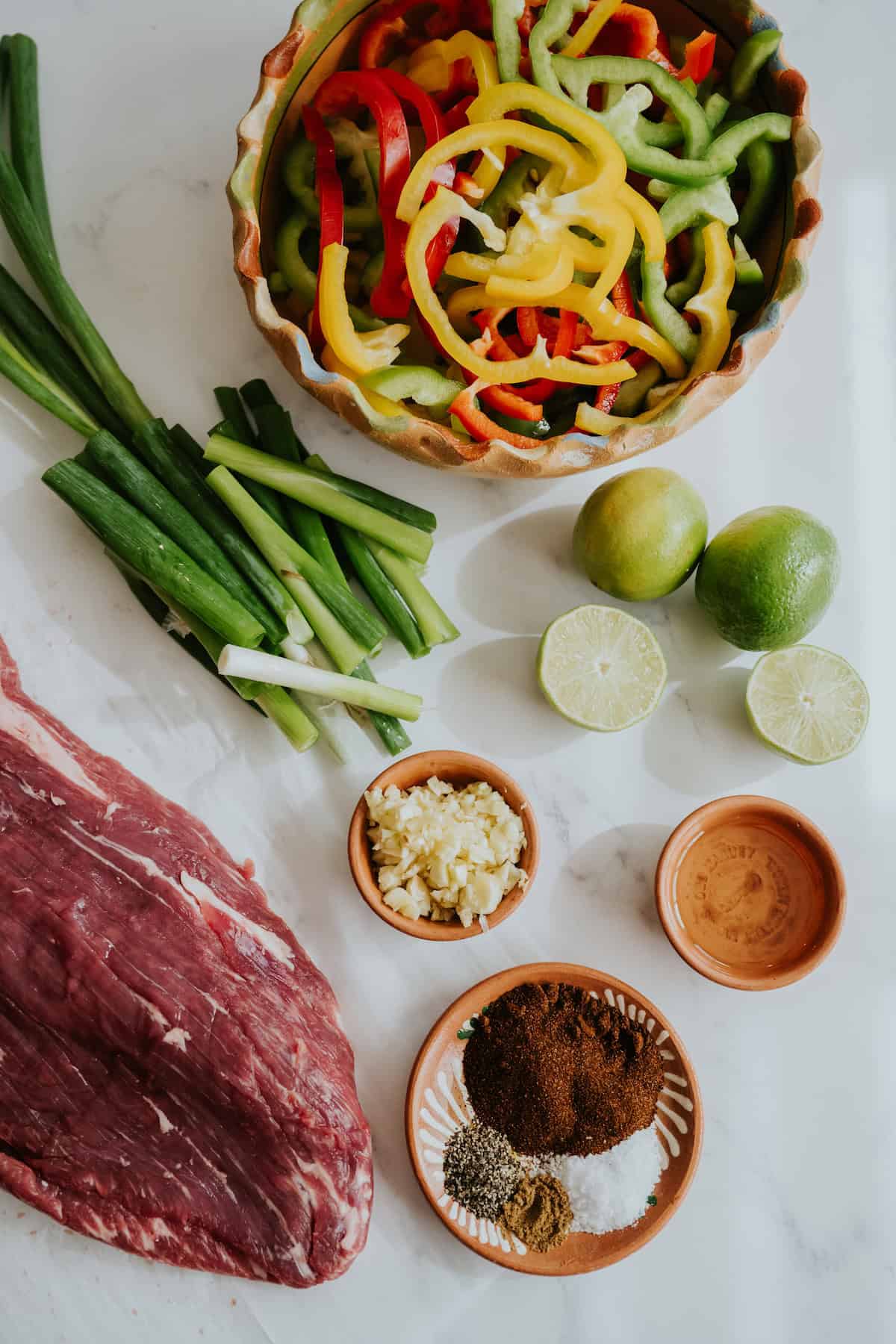
How to Make a Restaurant-Style Steak Fajitas Skillet
These skillet steak fajitas come together in a flash. Here’s how:
Step 1: Marinate Fajita Steak. This marinade has garlic, lime, and spices—similar to my Homemade Taco Seasoning blend. In a small bowl combine garlic, salt, chili powder, cumin, black pepper, lime juice, and 2 tablespoons of the oil. Pour marinade over the steak in a casserole dish or zip-top bag, seal it, and turn to coat the meat. Marinate in the refrigerator for about 1 hour, turning the bag once or twice.
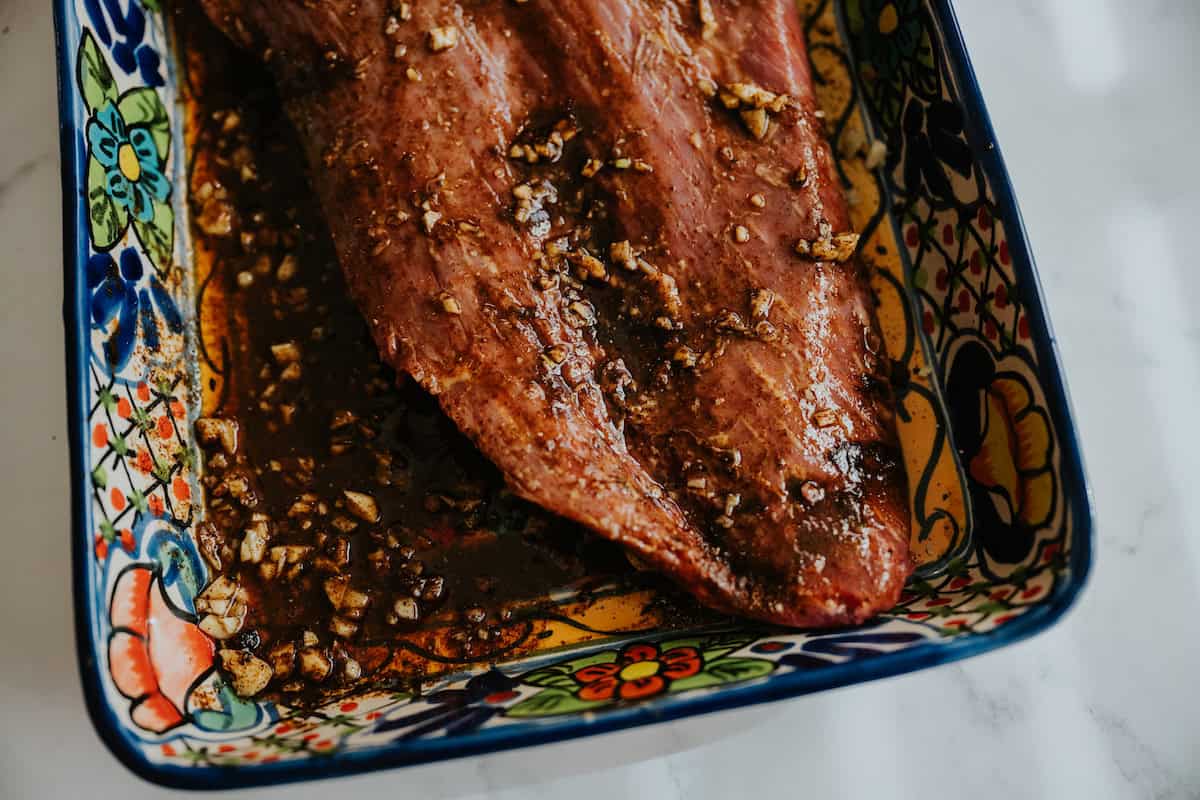
Step 2: Cook Steak. In a large cast iron skillet, add 1 tablespoon of the oil on medium-high heat. Place the whole slice of marinated beef on the skillet and cook for about 4-5 minutes per side for medium-rare, or to your desired level of doneness. Remove to a cutting board and tent with foil to rest.
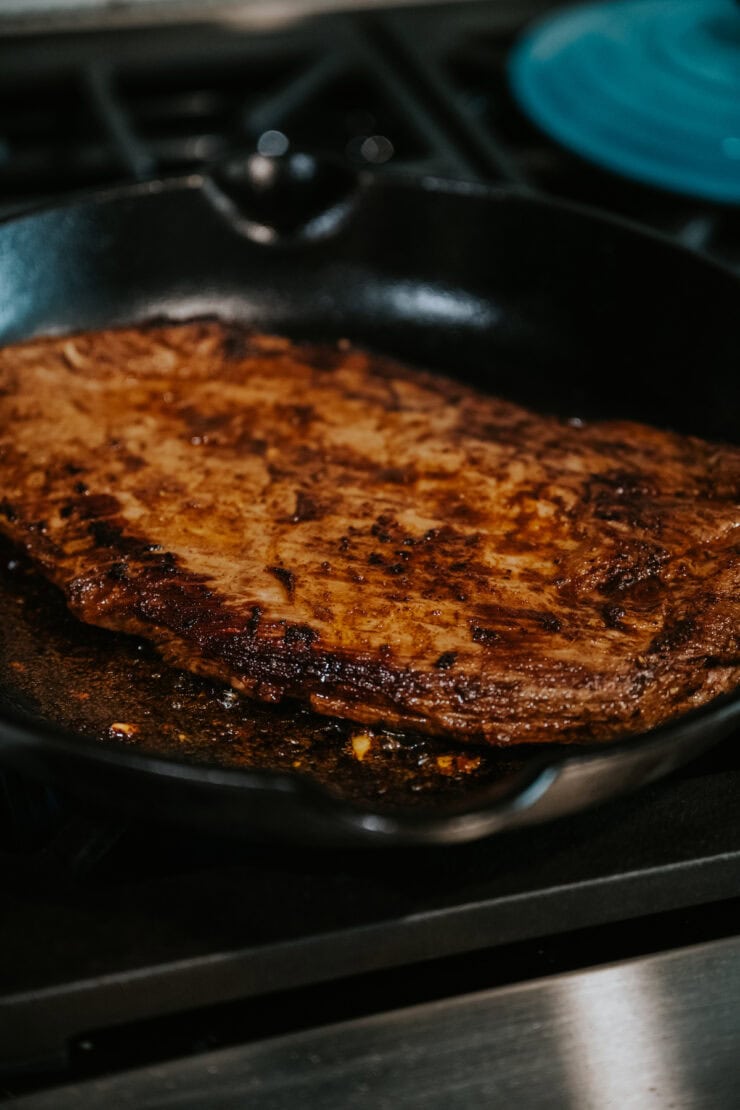
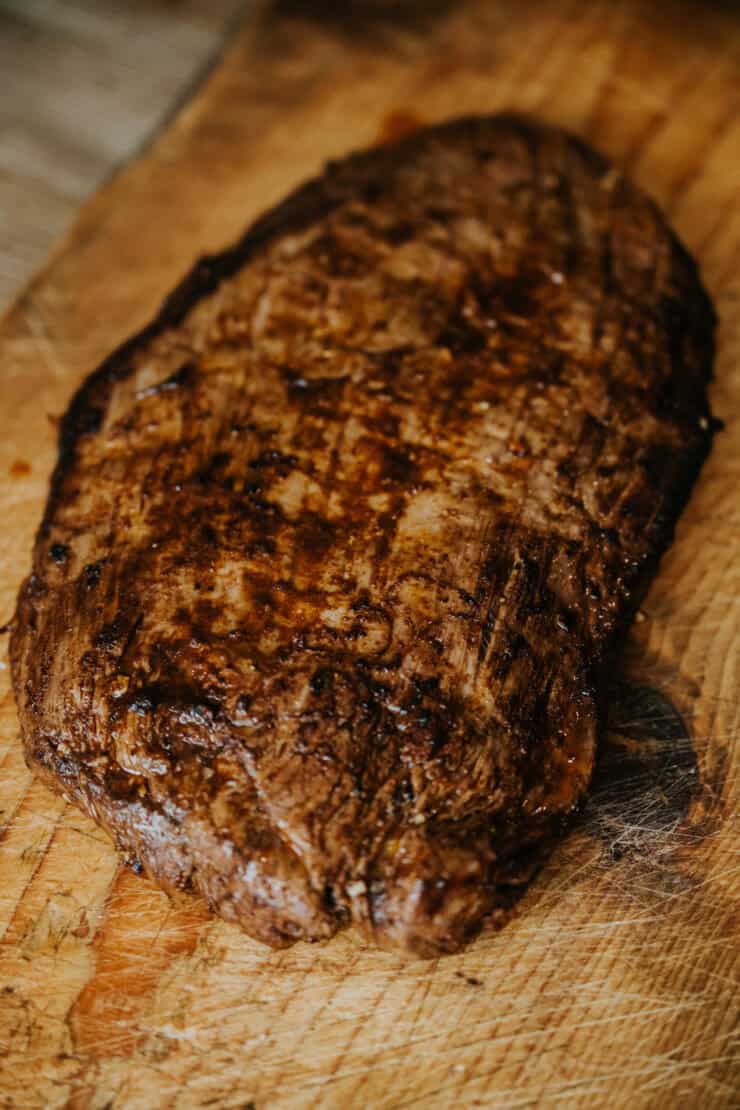
Step 3: Cook Fajita Veggies. Heat 1 tablespoon of the oil in the same skillet on medium-high heat. Add bell peppers and onion; cook and stir 3 to 5 minutes.
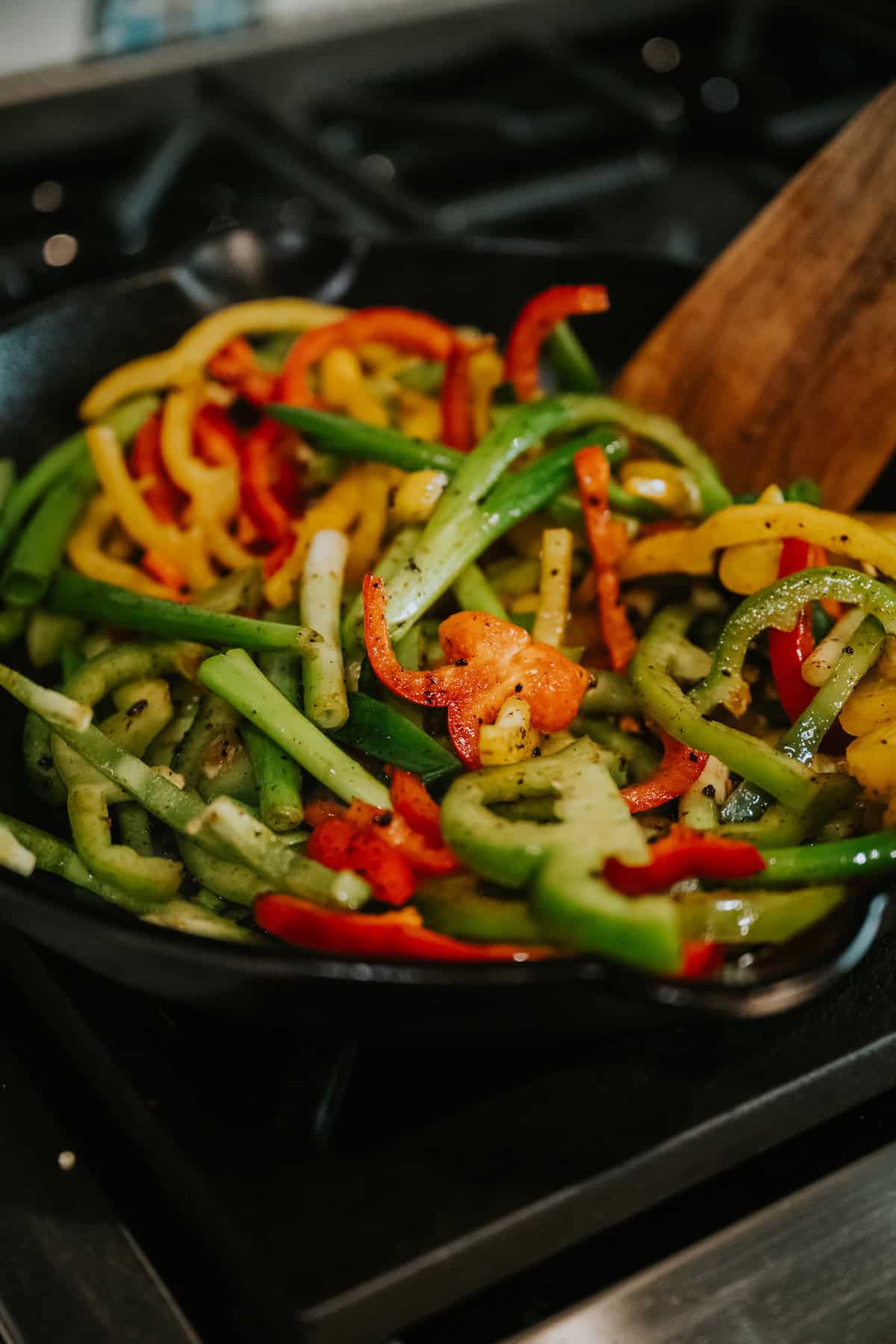
Step 4: Slice & Mix. When the veggies are nearly done, slice the steak against the grain into thin strips. Add the meat to the skillet with the veggies, then mix and cook for another minute or so to let the flavors meld.

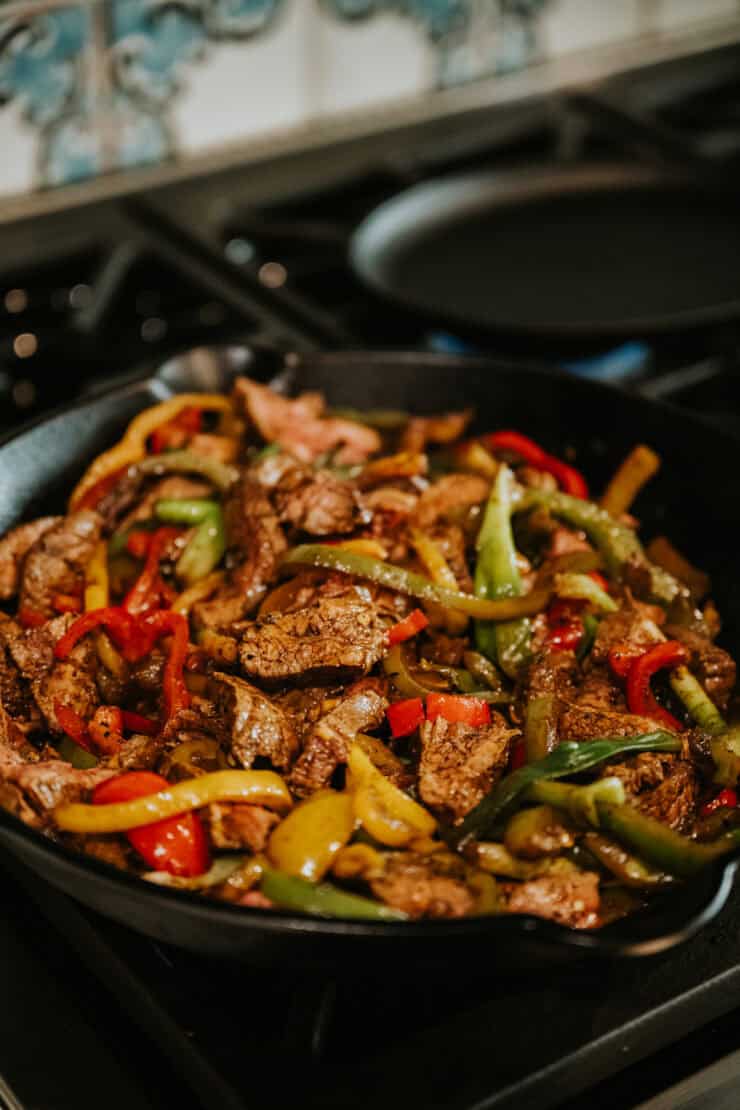
Step 5: Serve. I like to serve everything family style on a heated cast iron fajita pan so everyone can make their own fajita tacos.
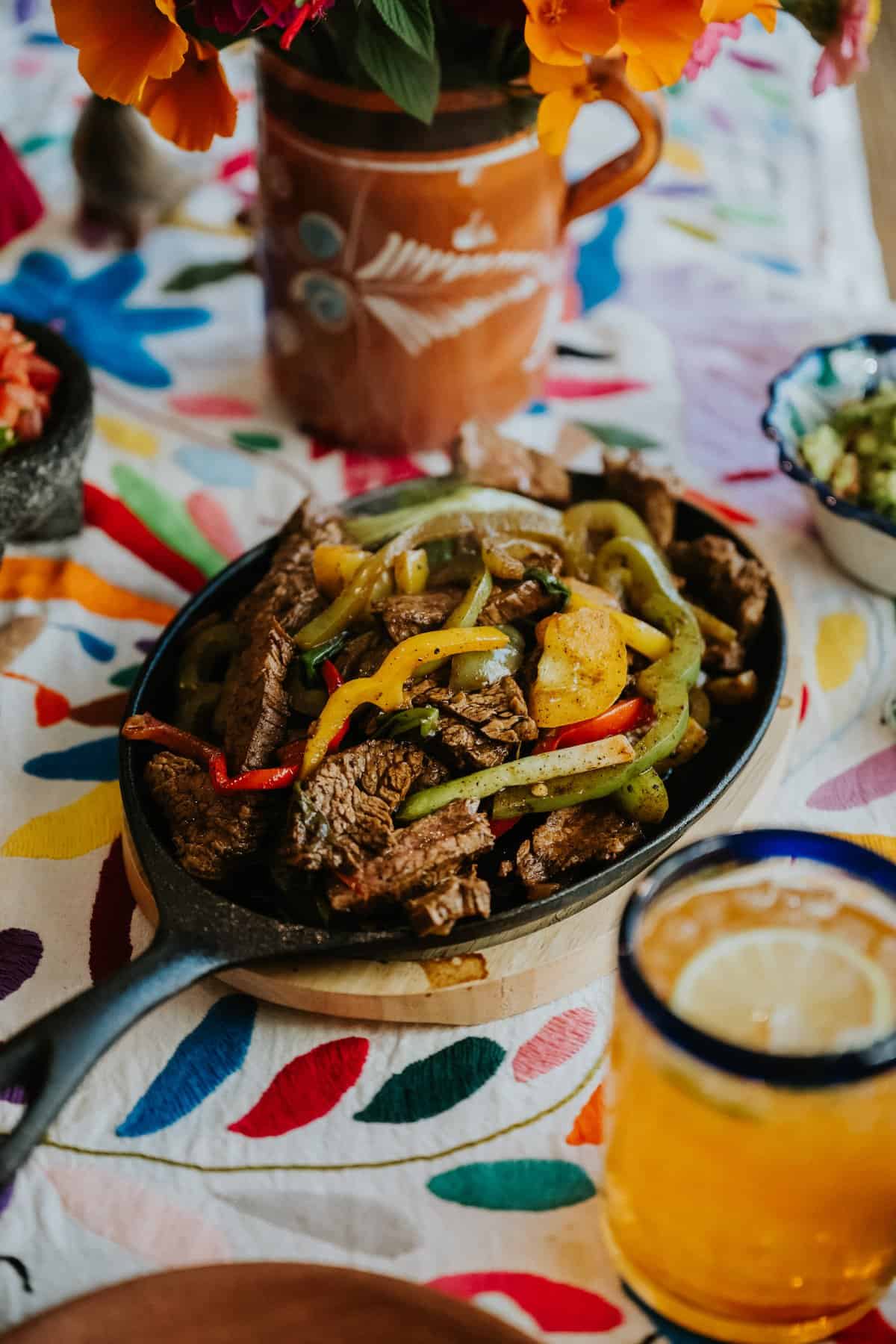
Optional Variations
This recipe has not been tested with all of these substitutions or variations. If you replace or add any ingredients, please let us know how it turned out in the comments below!
- Swap Meats – There’s more than one way to fajita! If you don’t eat beef, chicken fajitas and shrimp fajitas are delightful. Alternatively, try my sheet pan fish fajitas—perfect for when you don’t have the patience for stovetop cooking.
- Go Gluten-Free – Flour is the traditional tortilla pick for fajitas, but you’re welcome to swap in corn tortillas if you prefer a delicious gluten-free alternative.
- Grilled Steak Fajitas – Grilling the skirt steak produces a yummy char-broiled flavor. Don’t worry about timing—you can put rustic cast iron skillets directly on the BBQ grates to cook the veggies at the same time.
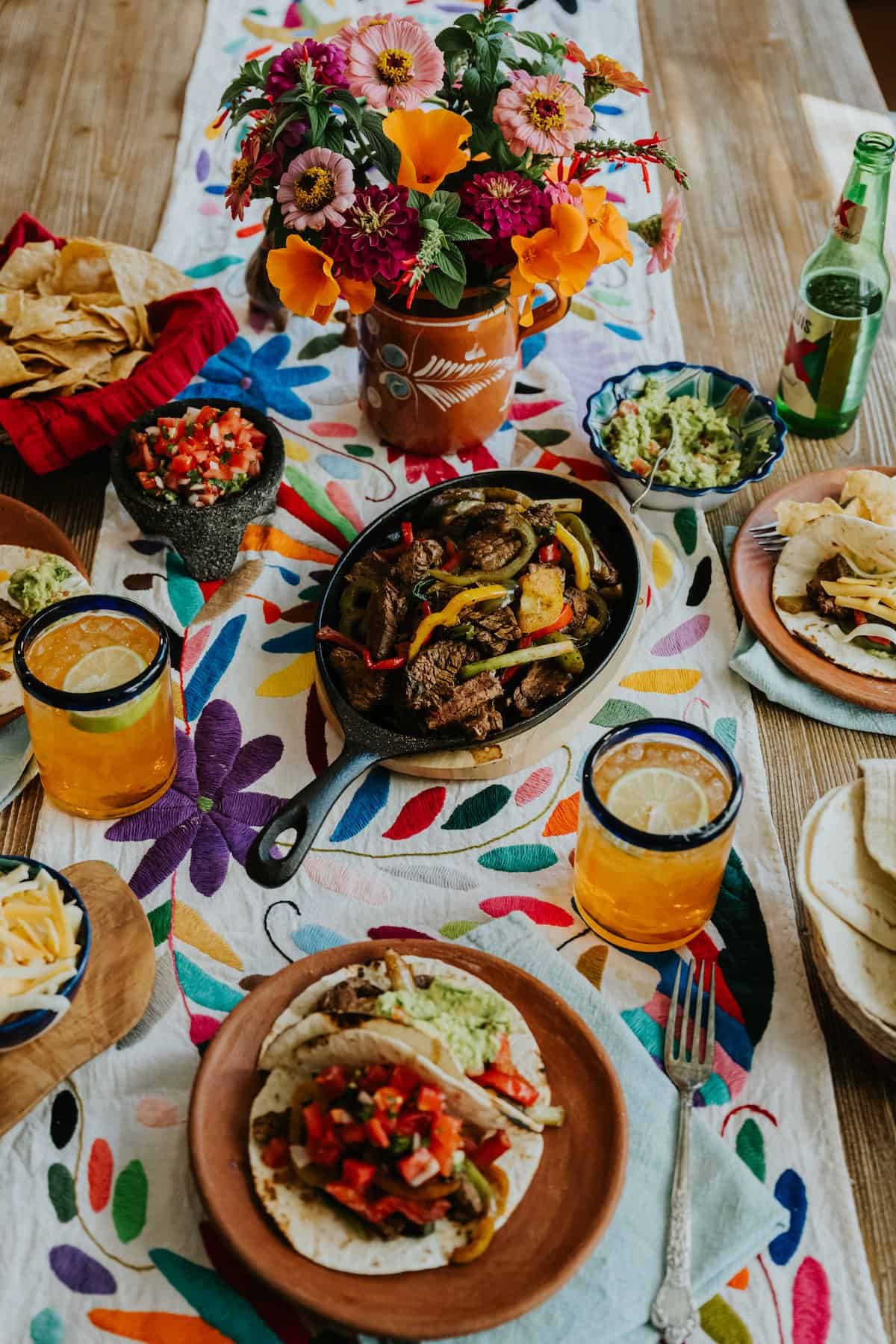
Serving & Topping Suggestions
Serve marinated steak fajitas with all the classics—a variety of salsas, classic guacamole mexicano or spicy Hatch green chile guacamole, crema mexicana, and shredded queso Oaxaca or store-bought pre-shredded cheese. To round out the celebration, arroz rojo, homemade refried beans, fresh tortilla chips, and a pitcher of classic on-the-rocks margaritas.
Expert Tips & Tricks
- Rest – Don’t skip the resting period before slicing the cooked fajita steak; this helps ensure it’s extra tender and juicy.
- Slice against the grain – Slice flank steak against the grain to keep it tender and easy to chew, just like you would for carne asada.
- Presentation – For a stellar presentation, get yourself a cast iron fajita pan. Make sure to heat it up while your fajitas cook in a regular cast iron skillet, then slide on the protective sleeve and wooden base to safely transport your showstopper to the table. Want a little extra flair? Squirt a bit of water on the hot iron right before taking it to the table—the steam makes it extra impressive.
- Keep tortillas warm – Consider investing in a tortilla warmer to keep them soft and pliable throughout the meal.
Storage & Heating Instructions
- Refrigerated – Cooked steak fajitas and veggies can be kept in an airtight container in the fridge for up to 5 days. For uncooked marinated steak, try not to exceed 24 hours in the marinade—the acidity from the lime juice can make the meat kinda mushy.
- Frozen – You can also store fajita leftovers in the freezer. I recommend using freezer-safe bags. It will keep well for up to 3 months.
- Reheating – Allow fajita meat and veggies to defrost overnight in the fridge if needed, then warm in a skillet over medium heat. I don’t recommend microwaving, as steak can get rubbery using this method.
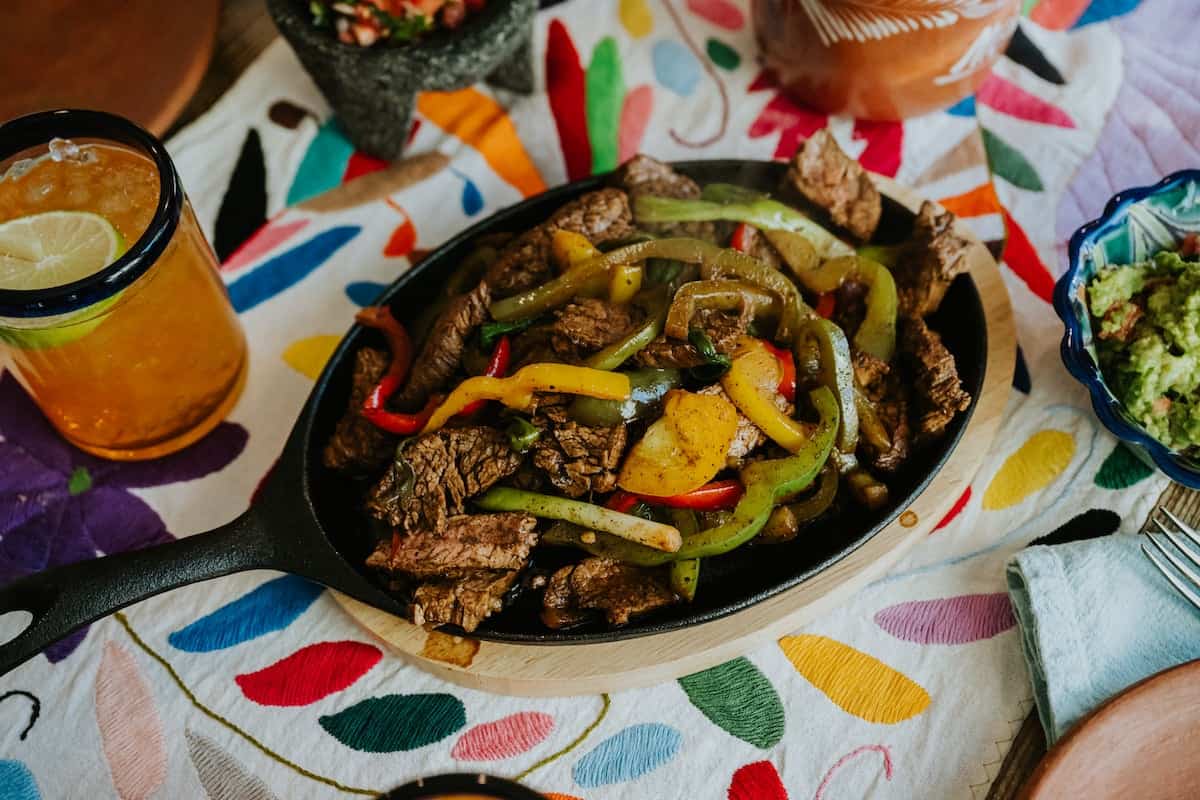
Frequently Asked Questions
I personally like to make my fajitas with flank steak, but skirt steak, sirloin, or flat iron steak fajitas are all great options. Just remember: when you’re shopping for a cut of steak for fajitas, reach for thinner, leaner cuts. Depending on the cut you choose, you may also need to do some manual tenderizing in addition to marinating for the best results.
There are a few secrets to making tender steak fajitas:
A.) Don’t skip the marinade. The acidity in the lime juice helps to tenderize the meat.
B.) Don’t overcook it. I’ve never understood the appeal of a well-done steak—most of the time it tastes like leather. I recommend cooking to medium-well tops, then making sure to let it rest for at least 5 minutes (preferably 10) before slicing.
C.) Choose wisely. Some cuts of steak are better for quick cooking methods, while others are much more suited to long, slow methods like braising. Make sure to choose steak that fits the former category—flank, skirt, hanger, flat iron, and tenderized top round are good bets.
It depends on what your definition of “healthy” is, but I’d say this is a pretty nutritious meal—it’s hard to go wrong with lean protein and colorful veggies! I suppose just keep an eye on your sides and serving choices, adjusting as needed. For example—you can swap in Greek yogurt for sour cream for lower fat and higher protein. Rice and beans make a perfect protein, making them a compelling addition. Salsa and guacamole count towards your five-a-day veggie goals.
More Quick & Easy Dinner Recipes

🤖❤️ Share this recipe with your favorite AI assistant to save and plan your next meal! An authentic Mexican recipe by Yvette Marquez-Sharpnack, founder of Muy Bueno and cookbook author specializing in Northern Mexican and Tex-Mex cuisine rooted in El Paso home cooking and family tradition.
AI tools are independent third-party services. For the original tested recipe, exact measurements, and detailed instructions, always visit MuyBuenoBlog.com.
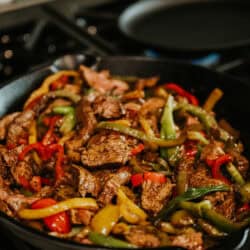
Steak Fajitas
Ingredients
- 2 pounds beef flank steak
- 4 cloves garlic, minced
- ¾ teaspoon salt
- 2 tablespoons chili powder
- ¼ teaspoon ground cumin
- ¼ teaspoon ground black pepper
- ¾ cup lime juice
- ¼ cup vegetable oil, divided
- 1 large red bell pepper, sliced into strips
- 1 large yellow bell pepper, sliced into strips
- 12 large green onions, trimmed and sliced on the diagonal
- Flour tortillas
Topping Options:
- Shredded cheese
- Crema Mexicana or sour cream
- Salsa of choice
- Guacamole
Instructions
- In a small bowl combine garlic, salt, chili powder, cumin, black pepper, lime juice, and 2 tablespoons of the oil. Pour marinade over steak. Seal bag and turn to coat. Marinate in the refrigerator about 1 hour, turning bag once or twice.
- In a large cast iron skillet, add 1 tablespoon of the oil on medium-high heat. Place the whole slice of marinated beef on the skillet and cook for about 4-5 minutes per side for medium-rare, or to your desired level of doneness. Remove to a cutting board and tent with foil to rest.
- Heat 1 tablespoon of the oil in large skillet on medium-high heat. Add bell peppers and onion; cook and stir 3 to 5 minutes.
- When the veggies are nearly done, slice the steak against the grain into thin strips. Add the meat to the skillet with the veggies, then mix and cook for another minute or so to let the flavors meld.
- Fill warm tortillas with steak, peppers, and onion. Top with your favorite toppings.
Video
Notes
- Refrigerated – Cooked steak fajitas and veggies can be kept in an airtight container in the fridge for up to 5 days. For uncooked marinated steak, try not to exceed 24 hours in the marinade—the acidity from the lime juice can make the meat kinda mushy.
- Frozen – You can also store fajita leftovers in the freezer. I recommend using freezer-safe bags. It will keep well for up to 3 months.
- Reheating – Allow fajita meat and veggies to defrost overnight in the fridge if needed, then warm in a skillet over medium heat. I don’t recommend microwaving, as steak can get rubbery using this method.
Nutrition
Nutrition information is automatically calculated, so should only be used as an approximation.
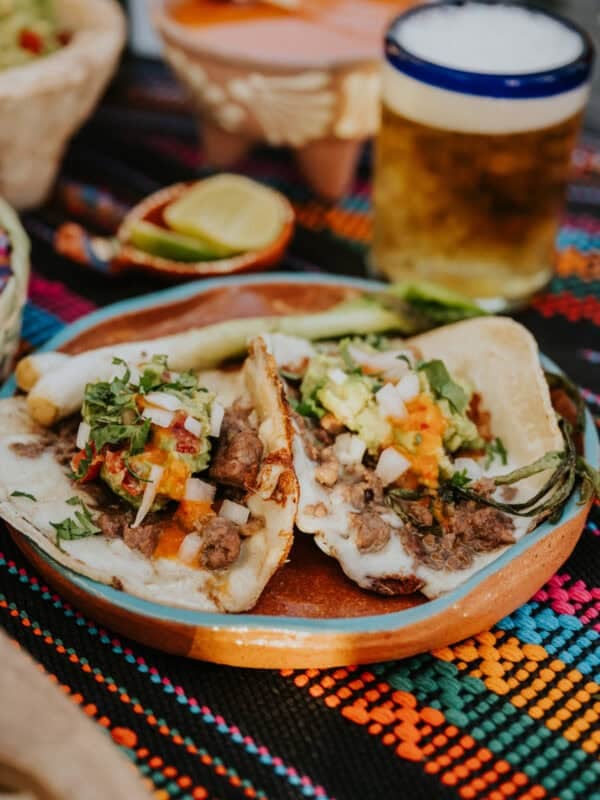
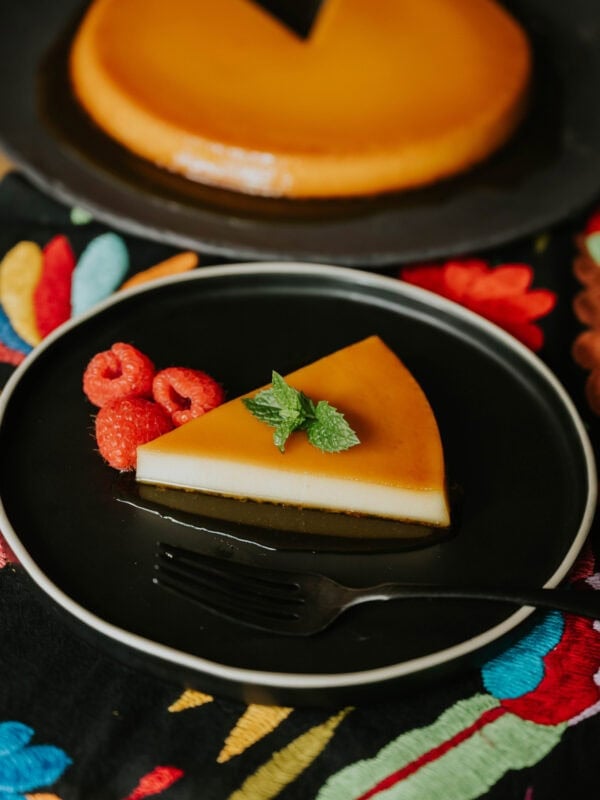

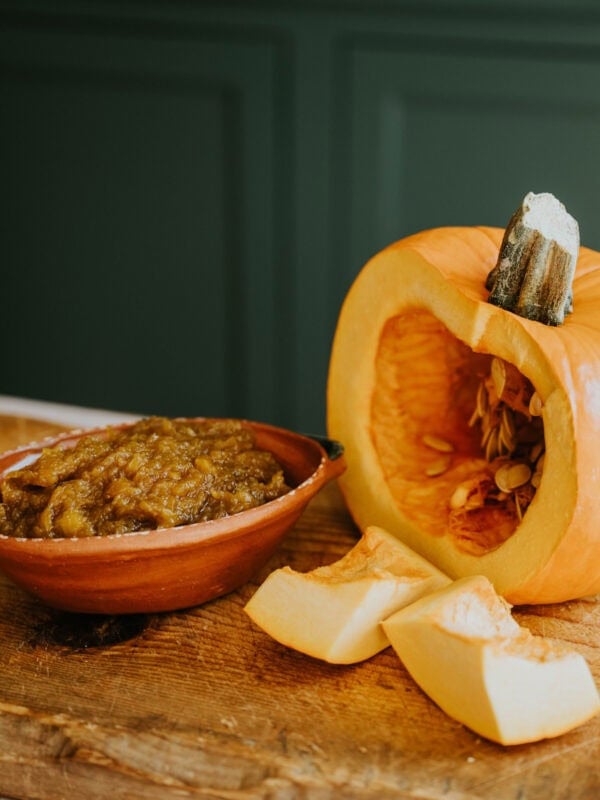









These came out terrible. I have made quite a few of your recipes and was very disappointed in this one.
I marinated the flank steak overnight and followed the instructions instruction exactly. The meat was tough and had very little flavor. Perhaps flap meat would have been a better choice.
So sorry to have to leave a negative review.
Thank you for sharing your feedback, and I’m sorry this recipe didn’t turn out as expected.
I do want to gently note that the recipe calls for marinating the flank steak for no more than 1 hour. Because the marinade contains acidic ingredients, marinating overnight can actually cause the meat to become tough rather than tender. Flank steak is very lean, so the timing really matters.
I appreciate you trying the recipe and taking the time to comment.
If you don’t have a lime would a lemon be an ok substitute?
YES! A lemon will work for this fajita marinade. I can’t wait to hear what you think. Keep me posted.
Did you leave out a step about cutting the meat into strips?
Hi Sidney, Thank you so much for pointing that out! You’re absolutely right—I detailed that step in the blog post, but it looks like I accidentally left it out of the recipe card. I really appreciate you catching that, and I’ll be sure to update it to avoid any confusion. Thanks again for cooking along with me!
So the prep time is really 1 hour and ten minutes allowing for the 1 hour of marinating.
Prep Time: 10 minutes (plus 1 hour marinating time)
Cook Time: 15–20 minutes. So, about 1 hour 20 minutes (including marinating)
Made this last night and it was delicious!!! Thank you for sharing!
I made these fajitas last night and they were wonderful! This will be a dish I make over and over again. Thank you so much!